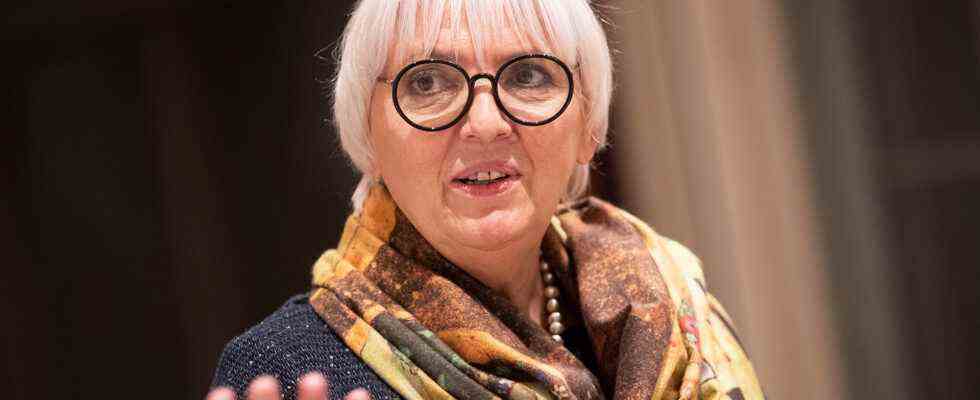Status: 03.02.2022 6:39 p.m
After the end of the TV channel RT in Germany, Russia banned Deutsche Welle from broadcasting – and is now receiving harsh criticism for it. Minister of State for Culture Roth called the step “in no way acceptable”.
Minister of State for Culture Claudia Roth has criticized the ban on the foreign broadcaster Deutsche Welle (DW) in Russia. “The broadcast ban on Deutsche Welle in Russia and the closure of its office in Moscow are in no way acceptable,” she said. The decision was obviously intended as a counter-reaction to the broadcast stop of the Russian television channel RT DE in Germany.
“However, the equation has no basis whatsoever,” emphasized Roth. RT DE is currently broadcasting without a license and has not applied for a license. This is “a completely different situation” than that of Deutsche Welle. “DW is also organized independently of the state,” explained the Minister of State for Culture and the Media. “That means, unlike RT DE, the German state has no influence on programming.”
She therefore urgently appeals to the Russian side “not to abuse the broadcaster RT’s licensing problems for a political reaction”. “Clear steps towards de-escalation are necessary,” explained Roth.
Closing of the correspondent’s office in Moscow: Russia bans Deutsche Welle from broadcasting
tagesschau24 3:00 p.m., 3.2.2022
Criticism also from other politicians
North Rhine-Westphalia’s Prime Minister Hendrik Wüst also criticized the broadcasting ban: “Russia’s actions against Deutsche Welle are a massive and arbitrary attack on press freedom, which we strongly condemn,” Wüst tweeted. Deutsche Welle, based in Bonn, stands for independent journalism and the exchange of cultures and peoples. “That is your clear mission.”
The FDP foreign politician Alexander Graf Lambsdorff called the ban on broadcasting “a reaction by Moscow that is as transparent as it is wrong” to the German media regulator’s decision to license RT DE. Deutsche Welle is “just not a state broadcaster” like RT DE, “but offers an independent program”. The decision shows once again that the Russian government is moving away from universal values such as democracy and freedom of expression and that the country is moving further into self-isolation.
Ban on broadcasting and withdrawal of accreditations
In addition to the broadcast ban on Deutsche Welle, the Russian Foreign Ministry also ordered the closure of the correspondent’s office of the German foreign broadcaster in Moscow and the withdrawal of journalists’ accreditations.
The ministry announced that the distribution of Deutsche Welle’s Russian-language program via satellite and all other transmission channels was banned. In addition, proceedings are being initiated to declare Deutsche Welle a “foreign agent”.
Sanctions are also planned against “representatives of German state and public structures involved in restricting the broadcasting of RT,” the Russian Foreign Ministry said. The measures are a “first step” in Moscow’s retaliatory measures. There will be another response in due course.
Deutsche Welle wants to take legal action against step
After the ban, Deutsche Welle immediately announced that it would take legal action against the broadcast ban. DW director Peter Limbourg said: “The measures taken by the Russian authorities are in no way comprehensible and a complete overreaction.” One is made into a pawn in a way that the media would only have to experience in autocracies. Limbourg added: “We are protesting in all forms against this absurd reaction by the Russian government and will take legal action to take action against the announced measures.”
The director also made it clear: “Until the measures are officially sent to us, we will continue to report from our office in Moscow”. Even if the bureau were to close, it would not affect reporting on Russia. The director even spoke of a significant increase in reporting.
“Cheap Return Coach”
The German Association of Journalists reacted immediately to the ban on Deutsche Welle. He called on Russian President Vladimir Putin to immediately reverse the decision. “There is no justification whatsoever for this drastic censorship measure,” said DJV national chairman Frank Überall. The step is a “cheap tit for tat” for the decision of the German media regulator.
Everywhere defended the German approach, because in contrast to the “propaganda channel RT DE”, Deutsche Welle offers independent and critical journalism. A “clear and unmistakable protest” must now come from the federal government, explained Everywhere.
Kremlin: Attack on freedom of speech and freedom of the press
The regulators of the competent commission for approval and supervision (ZAK) at the media authorities had forbidden the event and the distribution of the television program RT DE on Wednesday. The reason given was the lack of a broadcasting license.
The Kremlin spoke of an attack on freedom of expression and freedom of the press. “The situation is perfectly clear: a Russian mass medium, I would even say an international mass medium, is banned from broadcasting in Germany. This is nothing more than an attack on the freedom of speech,” spokesman Dmitry Peskov said, according to the Interfax agency.
Critics accuse RT of Kremlin propaganda
RT – formerly Russia Today – broadcasts in many countries and sees its German-language program as a contribution to the diversity of opinion in Europe. Critics, however, accuse RT of Kremlin propaganda and disinformation.
RT editor-in-chief Margarita Simonyan proposed on Wednesday to take action against Deutsche Welle in Russia. The Russian Foreign Ministry has repeatedly threatened to take action against German media and correspondents in Moscow, but has left concrete steps open.
Deutsche Welle is Germany’s international broadcaster. It was founded in 1953 and is an institution under public law and part of ARD. The station offers programs in 30 languages on television, radio and the Internet. The head office is in Bonn.
Russia closes Deutsche Welle
Andrea Beer, ARD Moscow, February 3, 2022 4:32 p.m

